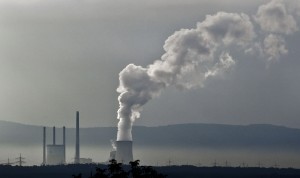Pennsylvania’s Climate Change Future: Read The Missing Report

Frank Rumpenhorst DPA /LANDOV
A 2009 state report found Pennsylvania contributes one percent of the world’s greenhouse gases.
A pair of legally-mandated reports outlining how climate change will affect Pennsylvania are currently a year overdue.
The state’s Climate Change Act required the publication of both reports in 2009, followed by an update every three years.
Both documents were due last year, but they’re still under review, and the state Department of Environmental Protection won’t say when they will be released.
StateImpact Pennsylvania has obtained one of the original draft reports. It was written by a team of scientists from Penn State University and submitted to the DEP in early 2012.
Report predicts demise of Pa. ski industry
Roundtop Mountain Resort in Lewisberry, York County, was once known only for winter recreation.
These days visitors can come year-round, to shoot paintball, tackle the ropes course, or slide down its zip line.
Chris Dudding is the resort’s marketing director. He’s worked here for two decades and watched as they’ve added more and more summer activities.
“I think the industry is trying to insulate themselves from the strange ups and downs of the weather,” he says.
It’s not a bad idea.
Although Roundtop has relied on artificial snow-making since it opened in the 1960’s, scientists say there will come a time when Pennsylvania’s nearly two dozen ski resorts will no longer be economically viable—even with man-made snow.
The Penn State researchers noted the decline of the state’s ski industry in their 2009 report and they mentioned it again in the yet-to-be-published 2012 update.
“ … southern, lower elevation, smaller resorts (such as those in Pennsylvania) will reach a point where artificial snowmaking to sustain resort operation is no longer financially feasible,” they wrote.
“I just don’t know why it’s not available”
“[The report] is a pretty good guide,” says George Ellis, president of the Pennsylvania Coal Alliance. “If there are any issues that warrant attention, you follow that. I just don’t know why it’s not available.”
Ellis is a member of the DEP’s Climate Change Advisory Committee. He doesn’t believe the report shows anything too dramatic happening in the future.
He points out that aside from some weather-sensitive industries like skiing, the report finds climate change won’t have a significant effect on Pennsylvania’s overall economy.
“That’s one of the reasons I want to see that report finalized, frankly,” he says, “It bolsters our argument.”
Others would like to see the report published to help direct the state’s policy decisions, and because it’s publication is required by law.
The DEP missed its legally-mandated deadline in April 2012.
At a meeting of the Climate Change Advisory Committee last week, state Rep.Greg Vitali (D- Delaware) asked DEP staffer Jessica Shirley where the Penn State report is within the agency.
He wanted to know specifically whose desk it’s sitting on.
“The only way you’re going to push this along is if you really have a clear sense of the track [the report] has to follow, where it is on that track, and what it takes to move it to the next stop,” Vitali told her.
Shirley replied that she didn’t know where it was.
“I can find out soon,” she said.
As StateImpact Pennsylvania has previously reported, internal DEP emails revealed an effort by Shirley (who works in the agency’s Policy Office) to keep a controversial study from Cornell University out of the climate report. The study questions the climate change benefits of natural gas.
Shirley has said she’s changed her mind and the study will be in the final report when it’s published.
A “frustrating” process
Other members of the panel are similarly frustrated by the delay.
The other overdue climate report is an action plan for lowering greenhouse gas emissions—that’s nearly a year late.
The environmental group PennFuture recently filed an open records request to access the Penn State report and has shared the document with StateImpact Pennsylvania.
Christina Simeone works for PennFuture and chairs the Climate Change Advisory Committee.
She says when the DEP finishes the other missing report –the greenhouse gas action plan–she doesn’t have high hopes for it.
“It will probably be a C effort, rather than an A effort,” she says, “I think we could be looking at a lot more, [and] getting things done faster. But we’re really just slogging through trying to get what’s required done.”
The DEP staffer who was charged with overseeing the publication of both climate reports recently resigned out of frustration, saying he didn’t get the support necessary to do his job.
Now there’s just one full time employee assigned to deal with both documents.
Simeone says that’s a big part of the problem.
“It’s difficult because there are so few resources dedicated to this from the department and that has resulted in a prolonged process that has been frustrating.”
It’s unclear when the reports will be published, but it is clear the ski industry is already thinking ahead.
In fact, Roundtop changed its name a few years ago. “Ski Roundtop” became “Roundtop Mountain Resort.”
The scientific consensus around climate change is also getting stronger.
Earlier this summer, a leaked draft report from the Intergovernmental Panel On Climate Change showed the world’s scientists are now nearly certain human activity is causing the observed warming.
A final version of that report will be presented later this month in Stockholm, Sweden.
Read the original draft of the Pennsylvania Climate Impacts Assessment Update, submitted by Penn State to the DEP in early 2012:
















